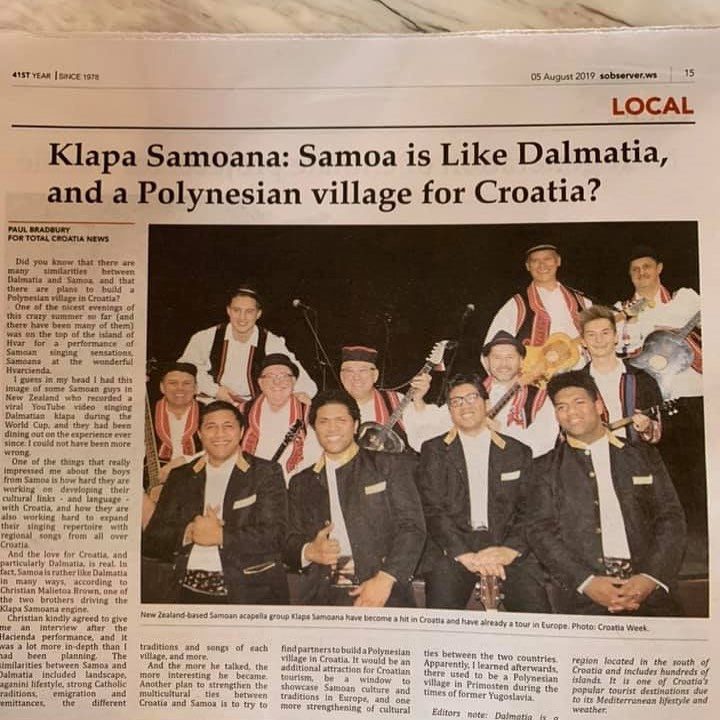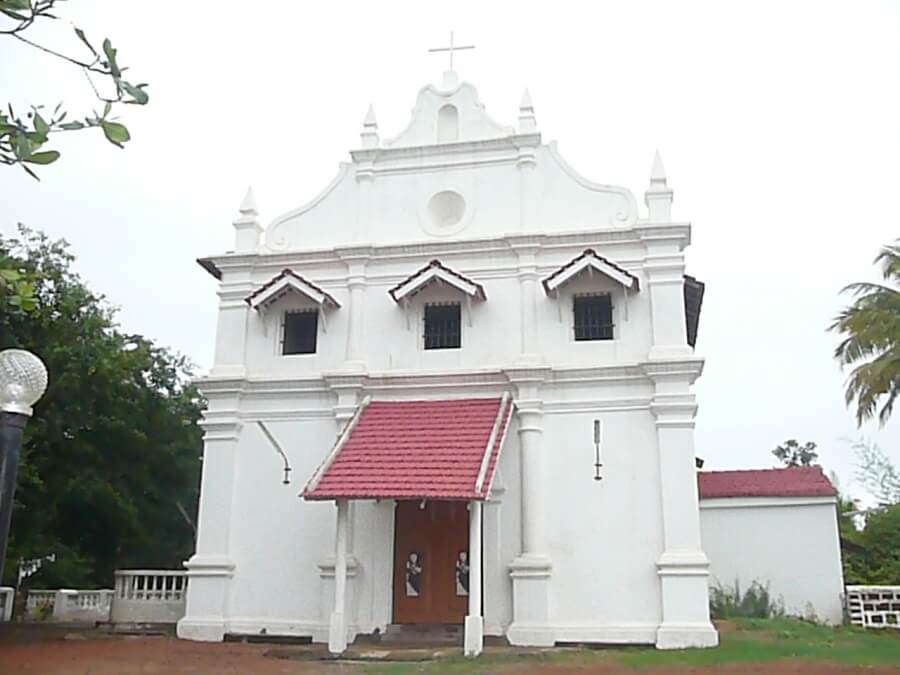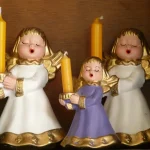August 7, 2019 – As the Samoan klapa sensations continue their tour of Croatia, are there any other examples of Croatian traditions and culture in unusual places? Oh yes…
TCN appeared in the Samoa Observer this week, the first time we have written for a publication in the Pacific. The topic, of course, was the wonderful Klapa Samoana, the Samoan Dalmatian klapa group who have taken Croatia to their hearts and won many Croatian admirers in the process, both inside Croatia and the diaspora.

I caught up with Christian from Klapa Samoana after a wonderful performance on top of the island of Hvar at Hvarcienda. It was a really interesting interview covering a number of issues, including plans to build a Polynesian village in Croatia – you can check out the whole interview in the video below.
Klapa Samoana got me thinking though. The idea of a Samoan group singing Dalmatian klapa was very unusual – were there any other Croatian traditions and cultures which were equally unusual happening in unlikely parts of the planet?
It turns out that there are… Many thanks to the many of you who answered my call for suggestions on my Facebook page yesterday. Here are my top 10:
1. The Sinj Alka knights tournament, African-style
You can take Croatians out of their country but they will find a way to continue with their traditions no matter where they are. Just as we found out the winner of this year’s “original” Alka, a very interesting version of this tournament took place in 2015 in a small town of Lephalale in South Africa by the border with Botswana thanks to the idea and enthusiasm of Josko Ugrin from Zrnovnica. Read the full TCN report from 4 years ago.
It doesn’t quite have the ceremony, uniforms and groomed horses of the original Alka, but I really like their improvised style.
2. Dalmatian klapa, Samoan-style
We have written a lot about the boys from Samoa recently, so no need to repeat. Enjoy instead the video which made them famous, as they wished Croatia’s World Cup heroes good look for last year’s final. And keep up with the latest via the Klapa Samoana Facebook page. Keep up the good work!
3. Dalmatian villages, Texan-style
Where else would you build a Dalmatian village if not in Texas? Developer Jeff Blackard built Adriatica, a Croatian-inspired village in McKinney, Texas. He explains the project in this interview with TIME.
4. Croatian folklore, Milwaukee-style
(with thanks to Ivica Profaca)
“The Milwaukee Croatian Tamburitzans perpetuate and promote the music, dance, and culture of the Croatian people, by the use of the tamburitza, which is the national folk instrument of our Croatian heritage.” Learn more from the official website.
5. Croatian opera, Japanese-style
(with thanks to Dear Leader Joe)
“U BOJ! is a very popular song in the Japanese glee choir. It is from the opera “Nikola Subic Zrinski” by Ivan Zajc.
After the end of World War I, a Croatian mariner’s ship sunk in Japan. While they repaired their ship, “U Boj” became a very popular glee song in Japan. This movie was played by “Funken glee club” in Japan at “Funken glee club 2nd concert on July 9, 2006. Almost all “Funken glee club” members live in Toyohashi city. Toyohashi city is near Toyota city which is famous for car production.”
6. British Royal Wedding and Coronation celebrations, Croatian wine-style
Many people may be discovering Croatian wine only recently, but the British Royal Family has been enjoying its quality for years, and one winery in particular. Some 11,000 bottles of Ilocki Podrum Traminac was served at Queen Elizabeth’s Coronation in 1953. And the Royal love affair did not stop there, as Croatian Ilok goodness was served at the weddings of both William and Kate, and Harry and Meghan. Learn more in the video above.
7. Indian churches, Dubrovnik-style in Goa

(with thanks to Miso Mihocevic – photo credit www.goanchurches.info)
“Originally the St. Blaise Church, Sao Bras was a small Chapel built in 1541 by Croatian sailors and traders settled in this village. It was elevated to a Parish Church in 1563. Prof Z Matisic, a Croatian scholar, came across some historical records in her country about her city, Dubrovnic’s links with Goa. She came to Sao Bras and standing before the church exclaimed: ”This is a replica of the one in Dubrovnic, dedicated to St.Blaise, the patron of our City!”. To revive the four century old ties, a 15 – member parliamentary delegation of the Republic of Croatia visited St. Blaise Church, Sao Bras on April 1, 1999. The belfry of Sao Bras church has 2 bells, the bigger one being from the ruined church of Santa Luzia in Daujim. The present parish comprises the villages of Gandaulim and Daujim (part) in Tiswaddi and the island of Kumbharjua.” Read more.
8. Commemorating the Croatian war sacrifice, the French way
(with thanks to Dear Leader Joe)
September 17 is a day when Croatia is remembered in Villefranche de Rouergue in France. On this day in 1943, Croatian and Bosnian soldiers rose up in rebellion against the Nazi regime. You can read about the history here. Their sacrifice is remembered each year in Villefranche de Rouergue at the Avenue des Croates.
9. Writing the tune for the German National Anthem, Croatian-style
The next time you hear the German National Anthem, have a little thought for Croatian folk music which is where young Haydn got his inspiration. Judge for yourself in the tune above.
Franjo Kuhac was a “researcher who first propounded the view that Haydn’s music abounds in Croatian folk tunes was the Croatian ethnologist Franjo Kuhač, who gathered a great number of Croatian tunes in his fieldwork. Kuhač’s views, published in Croatian in his Josip Haydn i hrvatske narodne popievke (Zagreb, 1880) were made better known in English speaking countries by the musicologist Henry Hadow, in his book A Croatian Composer (1897) and in various editions of the prestigious Grove Dictionary).” Learn more.
10. Writing the hits for Frank Sinatra, Croatian-style
(with thanks to Dear Leader Joe)
Strangers in the Night might have been a massive hit for Frank Sinatra, but he has a Croat to thank, for it was written by Ivo Robic and first performed in Split.
“This song was originally written by Ivo Robic for a music festival in Split, Croatia; Robic later recorded versions of it in Croatian (“Stranci u Noci”) and in German (“Fremde in der Nacht”). English lyrics about love at first sight were written by Charles Singleton and Eddie Snyder.” Learn more.
Do you know of an unusual Croatian tradition, culture or fact which might be interesting to cover? Contact us at [email protected]










